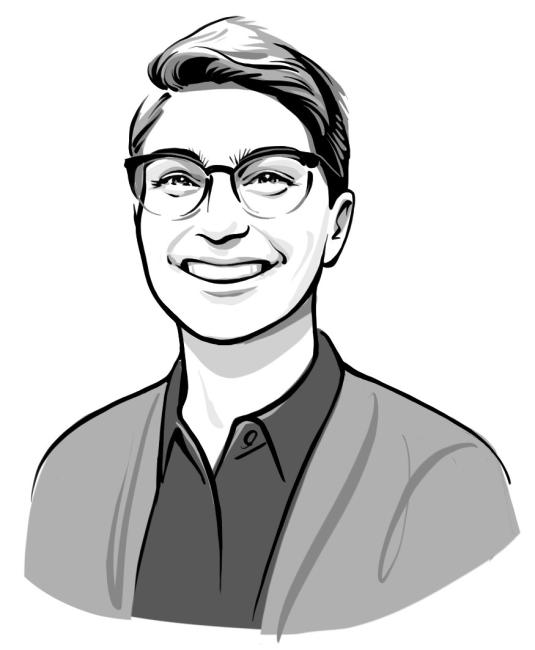November 2022: Handpicked
Each month, the Yiddish Book Center asks a member of our staff or a special friend to select favorite stories, books, interviews, or articles from our online collections. This month, we’re excited to share with you picks by Margaret Selinger.

Margaret Selinger is the education programs assistant at the Yiddish Book Center. She graduated from Wellesley College in 2021 with a BA in English and economics. Margaret first fell in love with Yiddish while singing with the Maxwell Street Klezmer Band’s Junior Klezmer Orchestra in Chicago. She began her formal language study at the Steiner Summer Yiddish Program in 2020 and completed the intermediate level in 2021. She now serves as the Steiner Program coordinator and assists on other educational programs and initiatives at the Center.
Itzik Manger’s rollicking, irreverent tale follows the adventures of a young angel, Shmuel Aba, who slips and schemes his way past the drunks, fools, and biblical figures who populate his home in the Garden of Eden. I first encountered Di vunderlekhe lebnsbashraybung as a beginner Yiddish student, reading through the novel with friends from class. Even at our slow pace, with many pauses to consult a dictionary, the outrageous antics and wry observations of Shmuel Aba sent us into peals of laughter.
Celia Dropkin’s “Odem” (“Adam”) Teacher Resource Kit
This resource kit, created by Anna Elena Torres, provides a useful introduction to poet, painter, and prose writer Celia Dropkin through the analysis of one particular poem, "Odem” (“Adam”). Dropkin’s erotic, enigmatic “Odem” captivated me from my first reading. There are two versions of the poem: the original, published in Dropkin’s 1935 collection In heysn vint (In the Hot Wind); and a second, shorter version published by her children in 1959. Although both share the biblical imagery of Adam and the apple, I find the structural flourishes in the original, such as the numbered stanzas and final dialogue between speakers, to be far more intriguing. This resource kit is an excellent place to start your own exploration of the poem, providing you with translations by Kathryn Hellerstein and Faith Jones, critical analysis, relevant biblical passages, and even a musical interpretation.
The Extraordinary Voyages of the Yiddish Jules Verne, with Sebastian Schulman
One might think that the purpose of translation is to hew as closely as possible to the language and intentions of the author. But as Sebastian Schulman explains in this online lecture, many Yiddish translations of famous literary works are more like what we could consider “adaptations”: reworking the original to speak to the interests and concerns of the translator’s Yiddish audience. Schulman illustrates this practice through Yiddish translations of Jules Verne, but his points about the process of translation will interest even those less familiar with Verne’s work.
Heyrat un fraye liebe. Opfer fun moral un di filozofye fun atheizm
Emma Goldman is a fascinating figure, and I was so pleased to find some of her work in the Yiddish Book Center’s collection. Although Goldman spoke and lectured in Yiddish, this is a translation of a 1914 English essay in which she argues that the institution of marriage is fundamentally opposed to love. The 34-page pamphlet, published in New York, also includes translations of two more of Goldman’s essays: “Opfer fun moral” (“Victims of Morality”) and “Di filozofye fun atheizm” (“The Philosophy of Atheism”). The translator hews close to Goldman’s words, unlike the Verne work, and the heavily German-influenced Yiddish (“heyrat” is a German word for marriage) is an enjoyable challenge.
Q&A
Tell us about your selections and what they say about your relationship with Yiddish language and culture.
These works each remind me of moments in my journey as a young Yiddishist: when I was introduced to a new idea that blew my mind, discovered a part of Yiddish culture I had never known about before, or simply times when I was proud of myself for being able to read and understand complex ideas in Yiddish. It was great fun to take a jaunt down memory lane and appreciate how far I have come.
What are you working on next?
Although it will not take place for many months, we have already begun preparations for the 2023 Steiner Summer Yiddish Program! I am very excited to meet our next group of students and help them begin their own Yiddish journeys. In the more immediate future, I am looking forward to the Di Froyen weekend program here at the Center. There will be so many brilliant thinkers in attendance, and I cannot wait to hear some of them speak in person.
